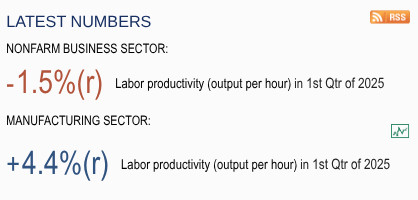Economists say you'll know AI matters when it shows up in the productivity data. Latest overall numbers are in fact a decrease, and with the one bright spot being manufacturing, whereas I would think AI should boost productivity in the service sector more, no?
Detailed: https://www.bls.gov/news.release/prod2.nr0.htm
Detailed: https://www.bls.gov/news.release/prod2.nr0.htm

Comments
I've personally seen manufacturing processes reduce their defect rate from 40% to 4% with some incredibly basic bespoke ML in the QA chain
Call centres could, but none of the ones I know really do
“When a measure becomes a target, it ceases to be a good measure.”
I fear over-fitting to the parameters measured to define “productivity”, but I really don’t know much about the process.
https://en.wikipedia.org/wiki/Goodhart's_law?wprov=sfti1
sometimes it's hard to tell when it's an output/numerator (good) phenomenon vs an input/denominator (bad/mixed)
covid data shows a good example, where mass layoffs caused the metric to spike once orgs adjusted
one can glean some info from productivity numbers, but it's not as "direct" as some other metrics like GDP or employment (which also have problems)
https://bsky.app/profile/coffeeindiana.bsky.social/post/3lrqawpjajc2i
Expect manufacturing to be on the trailing edge of AI for the same reason - I'd say look at life sciences and finance first.
I would say a marker for AI would be stable/increased productivity while jobless rate goes up though.
1. anecdata I've heard is "even when you do it right, the improvement is minimal, and it's easy to do wrong"
2. there's a ton of noise in productivity data right now due to politics
3. using genAI seems to make people dumber and feed into delusions, so long-term benefits are ???
It also makes a lot of mistakes.
The way he tells it, the AI tools will have replaced work, but even if they don't, productivity will be total wages (=Sam's wage) divided by total number of workers (=1), so it will be way higher than presently.